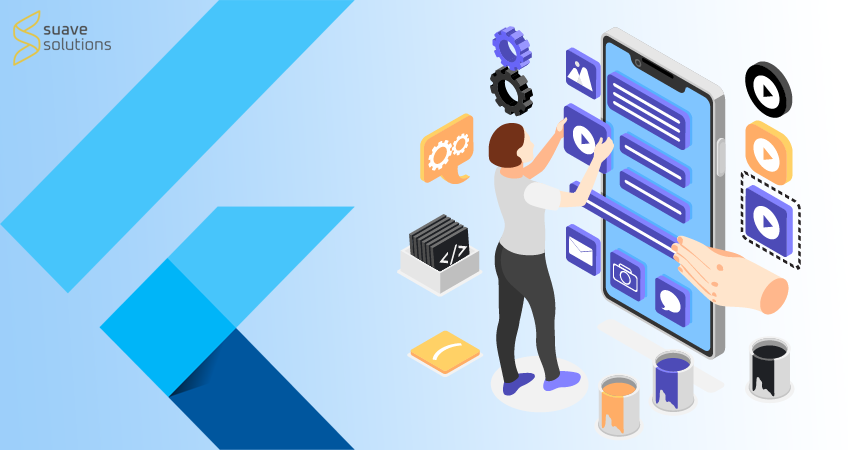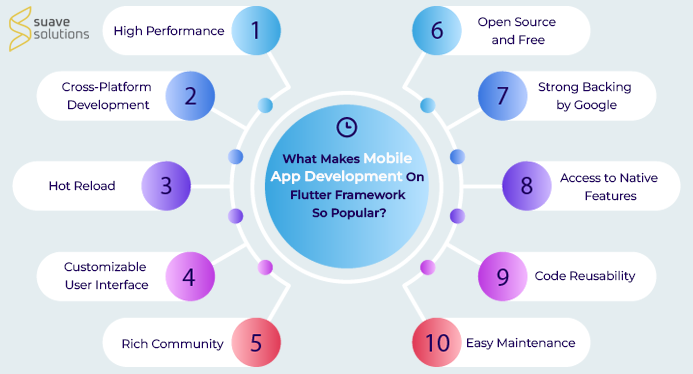Home » Blog » Mobile App » Why is Flutter the Future of Mobile App Development?
Why is Flutter the Future of Mobile App Development?

We live in a world where smartphones have become extensions of our very selves resulting in an unprecedented rise in the demand for innovative and seamless mobile applications. This trend has intensified the pursuit of the most efficient, versatile, and user-friendly development framework.
As we navigate the ever-evolving landscape of mobile app development, one platform has emerged as a shining beacon in this area – Flutter!
It is a revolutionary open-source framework from Google that offers unparalleled speed and efficiency. In this blog, we will explore why Flutter is the future of mobile app development. Let’s take an insightful dive into the future of Flutter!
The Flutter Framework
Flutter stands out as a sign of innovation and efficiency for mobile app development. With its high-performance framework, customizable user interfaces, and real-time updates, Flutter is bringing a flare of novelty to the realm of mobile app development.
What is Flutter?
Flutter is an open-source framework developed and launched by Google in 2017. It has rapidly gained popularity for its ability to create high-performance applications with rich user interfaces. Flutter toolkit enables the development of natively compiled applications for mobile, web, and desktop from a single codebase. It has a rich set of customizable widgets for creating a wide variety of user interfaces. Flutter also offers the Hot Reload option to allow making real-time changes to the code. With a focus on performance and a wide set of customizable widgets, Flutter has become an attractive choice for developers.
What Makes Mobile App Development On Flutter Framework So Popular?
The popularity of Flutter in mobile app development can be attributed to several key factors. Here’s an overview of some key benefits that determine the answer to “Is Flutter good for mobile app development”.
High Performance
Flutter compiles to native ARM code which makes the apps highly performant. Flutter apps achieve smooth animations and run at 60 frames per second to deliver a responsive and fluid user experience. The architecture and reactive framework of Flutter reduce latency resulting in a responsive user interface.
Cross-Platform Development
Flutter offers the ability to create applications for multiple platforms including iOS, Android, web, and desktop from a single codebase. This not only reduces development time but also ensures a consistent user experience across different platforms.
Hot Reload
It provides a Hot Reload feature that allows the developers to make real-time changes to the code and test the results immediately without needing to restart the app. This option speeds up the debugging and iteration process.
Customizable User Interface
Flutter offers a rich set of customizable widgets and a flexible design system that allows developers to create visually appealing and customized user interfaces.
Rich Community
Flutter has a rapidly growing and active community of developers. This contributes to a wealth of resources, plugins, packages, and support.
Open Source and Free
This is an open source and free-to-use framework. This allows for continuous contributions from the community to allow ongoing improvement and adaptability to changing technology trends.
Strong Backing by Google
Flutter is backed by Google which contributes to its credibility in the tech industry. Google actively invests in Flutter which ensures its long-term support and development.
Access to Native Features
This framework offers a wide array of plugins and packages. The developers can access and leverage native device features, APIs, and platform-specific services.
Code Reusability
One of the most prominent benefits of Flutter is its code reusability across different platforms. This feature streamlines the development process and creates a consistent user experience across platforms.
Easy Maintenance
Maintaining a single codebase is easier than managing multiple codebases. Updates, bug fixes, and new features can be implemented on all supported platforms simultaneously.
Flutter vs. Other Mobile App Development Frameworks
Developers consider a number of options while choosing a mobile app development framework. React Native and native app development frameworks (iOS and Android) usually come across as some options along with Flutter. Each framework has its strengths and weaknesses and the ultimate choice depends on the development goals and constraints. Here’s a comparison of Flutter with other frameworks to help you make an informed decision and understand the future of Flutter.
|
Feature |
Flutter |
React Native |
Native Development (iOS/Android) |
|
Programming Language |
Dart |
JavaScript |
iOS and Android Specific Languages |
|
Performance |
Excellent performance with native compilation |
Good performance but the bridge can introduce overhead |
Excellent performance as apps are optimized for specific platforms |
|
Code Reusability |
Single codebase for multiple platforms |
Single codebase for multiple platforms |
Separate codebases for iOS and Android |
|
User Interface |
Rich set of customizable widgets |
Native UI components. Requires more customization for advanced UI |
Native look and feel. Extensive design and implementation required |
|
Hot Reload |
Fast Hot Reload for real-time code changes |
Hot Reload for real-time code changes |
Not available in native development |
|
Community |
A growing community with reasonable support |
A large ecosystem with extensive third-party libraries |
Rich ecosystems for iOS and Android development |
|
Developed By |
|
Developed and maintained by Facebook |
Developed by Apple (iOS) and Google (Android) |
|
Access to Native Features |
Access to native features through plugins |
Through third-party modules |
Full access to platform-specific features |
|
Development Time |
Rapid development with code reusability and Hot Reload |
Rapid development with code reusability and Hot Reload |
Longer development time due to separate codebases |
|
Maintenance |
Easier maintenance with a single codebase |
Maintenance required for a single codebase |
Maintenance needed for separate codebases |
Cross-Platform Development with Flutter
Flutter combines excellent performance with a customizable user interface making it a preferred choice for developers. It enables cross-platform app development by providing a comprehensive framework for building applications that can run on multiple platforms from a single codebase. The future of mobile app development is being rewritten by Flutter’s efficiency, performance, and cost-effectiveness.
Here are some insights from the information provided by TriState Technology into why Flutter is considered a powerful tool for cross-platform mobile app development.
- As stated by TriState Technology, Flutter is backed by Google’s Material Design team which simplifies app development even for beginners.
- With minimal coding, it reduces development effort and time.
- The customizable UI components enhance mobile app development with built-in Material Design widgets.
- Hot reload facilitates real-time debugging and saves valuable development time.
- Due to the single codebase, the cost is reduced significantly making cross-platform app development more accessible to smaller businesses and startups.
- The efficiency of Flutter makes it perfect for Minimum Viable Product (MVP) development which is crucial for Agile methodologies and rapid market entry.
- Flutter uses its own rendering unit, Skia to ensure consistent user interfaces across platforms.
- Flutter allows developers to write a single codebase in the Dart programming language that is shared across all target platforms.
All these features contribute to making Flutter for mobile app development a popular choice among developers and organizations.
Is Flutter Good For Mobile App Development?
The answer to “Is Flutter The Future Of Mobile Development” is influenced by several factors. Flutter has many qualities that make it a strong contender for the future of mobile app development. Cross-platform capabilities, high performance, consistency and customizability, hot reload, and open source network are the highlights of this framework. It has the ability to evolve and allow innovation with the changing technology trends. The future of Flutter is undoubtedly promising and it’s a viable option in the dynamic field of mobile app development.
Get the Best Mobile Apps Developed by Suave Solutions
As the app development landscape continues to evolve, the features of Flutter position it favorably in meeting the emerging mobile Apps on latest trends.
If you are convinced to explore the capabilities of Flutter for mobile app development and need a trusted outsource partner, look no further than Suave Solutions. Our team of skilled Flutter developers is poised to turn your app vision into reality. Suave Solutions holds a strong track record of delivering high-quality, cross-platform apps. We offer cost-effective solutions that ensure you get more for your investment. By partnering with Suave Solutions, you’re not just outsourcing, you are getting a dedicated team committed to delivering top-notch Flutter applications.
Let’s work together to bring your app ideas to life efficiently and effectively. Contact us and join hands in building the future of mobile app development together!
Recent Posts
- The Future of Software Engineering by 2030 October 13, 2025
- How AI Chatbots Boost Customer Support & CSAT September 1, 2025
- Top Software Development Companies 2025: Choose the Right Partner August 8, 2025
- Healthcare Software Development Services: What to Expect in 2025 July 17, 2025
- How To Hire Software Developers For Your Startup June 27, 2025
Categories
- Business Solutions (12)
- Digital Marketing (2)
- E-Commerce (3)
- Mobile App (11)
- Software Developers (21)
- Software Teams (15)
- Team Outsourcing (14)
- Tech Trends (10)
- UI UX Design (4)
- Web Development (8)

